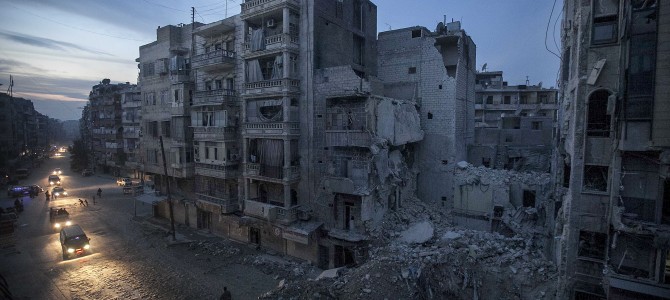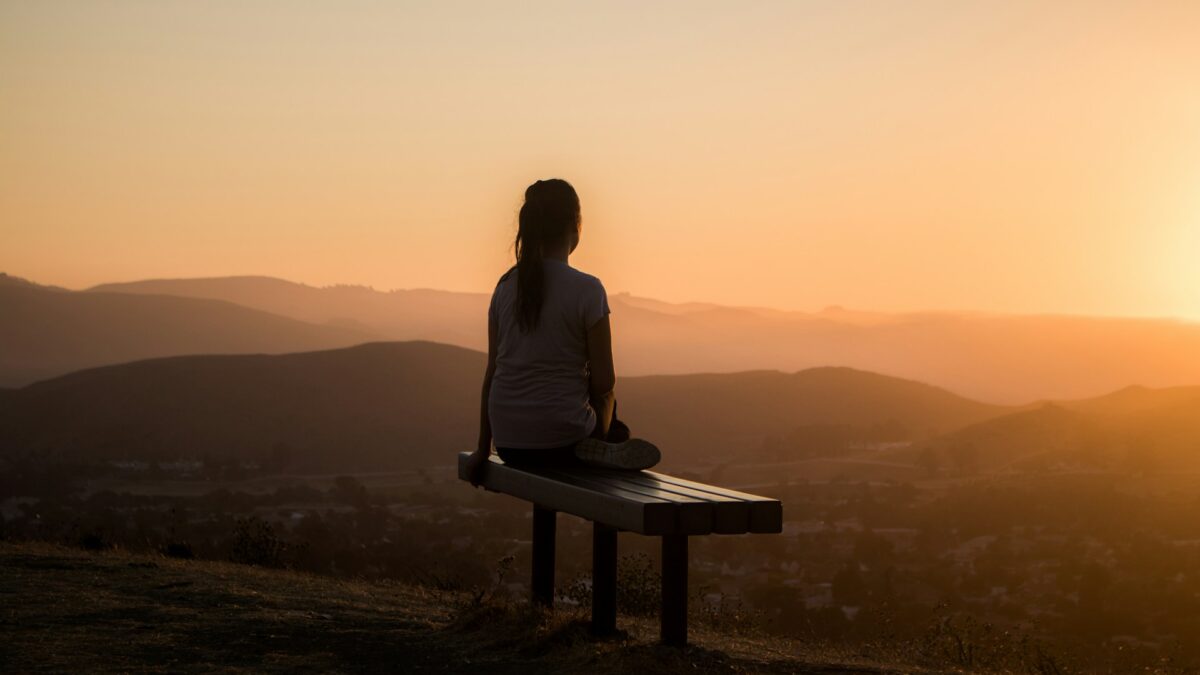
How should we respond to suffering in the world? Dannagal Young considers this in a Wednesday piece for The Atlantic, noting in particular the human tendency to shut out graphic and painful details of worldwide suffering:
When faced with mediated tales of oppression, war, pain and suffering, we often feel very little external control. How can we solve the war in Syria? How can we end racism? It feels too big to fix, and so, lacking in avenues for external control, we choose to exercise internal control. And the easiest way to do this is by avoiding the subject from that moment forward.
… Without media, our anxiety about the world would be largely determined by our real-world lived experiences instead of by the vicarious mediated experiences of others. Obviously, not everyone’s immediate experiences are the same. Class, race, and education predict real world exposure to crime, poverty, disease, and conflict. So, without broader exposure to current-events information, racial, educational, or economic backgrounds would play a larger role in creating each individual’s sense of the world than they otherwise might.
It is through media that the unafflicted and unburdened are able to pay witness to the experiences of people whose lives are more burdened by economic, political, social, or racial hardships.
Young asks us how we can combat this tendency to ignore or evade, arguing that we must—in order to properly “pay witness” to the suffering—take in the hurts of the world. “To have hope in the face of widespread pain or suffering means staying aware of the world, but simultaneously working towards the creation of something better,” she writes. “That might mean identifying avenues of agency to affect the particular issue, crisis, or event, perhaps through letter writing, charity, prayer, political discussion, organization or activism. Alternatively, it might produce a broader effort to improve the world, aimed toward the pursuit of kindness, compassion, generosity, justice, prayer, laughter, purpose, or art.”
In many ways, Young is right. We cannot ignore the hurts of the world. However, her story indicates a more cosmopolitan take on humanitarianism—one that, I would argue, can be paralyzing and frustrating for those without considerable financial and personal resources. Sometimes, instead of considering how we can “improve the world,” it’s important to consider instead how we can improve our home, neighborhood, city, or county. Philanthropy can and should start at home.
Struggling With Guilt In the Face of Suffering
When I was 16 years old, I began researching human trafficking. I’d just watched “Amazing Grace,” a film that chronicles the life of William Wilberforce, and I emerged from the theater convicted and charged with energy. Something must be done—surely there was something to be done.
But the research I did had a ravaging, harrowing effect on me. Reading about child soldiers in Uganda resulted in sleepless nights of sobbing; researching sex trafficking in Thailand left haunting images in my brain. I felt a guilt so deep, I didn’t know what to do with it. How to live this privileged, free, comfortable life, when others didn’t have it? How to keep breathing and eating and smiling, when others struggled and suffered so much?
That question continues to haunt me, and I don’t think I’ll never be rid of it. My list of torments has deepened. As a journalist, I often read (often by accident) the most sordid and haunting stories. In the first several months of my baby daughter’s life, I stumbled across stories of young children abused, raped, killed. I saw pictures of Syrian refugees—suffering, drowning, debris-covered—and my heart broke a million times over again.
The worst part of all this? There is a good degree of selfishness in my guilt. It’s turning the suffering back toward myself, toward a consciousness of my inadequacy. Feeling guilty is doing nothing. Yet, in the face of such monumental and widespread suffering, what can one person do? I cannot torture myself for having been born into a comfortable, middle American family. I cannot self-flagellate and starve myself in an effort to identify with those who suffer. Or perhaps I could—but again, I believe that would be a selfish reaction to this sadness. Besides, it wouldn’t help anyone.
The past decade has been a lesson in what to do with this painful, all-encompassing guilt. It’s a lesson I am still learning, and my answers are most definitely imperfect. But I proffer them up for others who see the pain in this world, and want to do something, yet feel powerless to act.
We Should Start At Home
There is pain in this world, pain that many of us will be unable to touch. But there is also pain in our own counties, cities, neighborhoods, and homes. One of the most convicting stories on this subject is Charles Dickens’ “Bleak House.” In it, he tells the story of Mrs. Jellyby, a philanthropist who is so consumed with her work in Africa, she doesn’t even see the plight of her children. They’re starved for attention and love, but she couldn’t be more callous.
I cannot heal the hurts of suffering children around the world. I wish I could, with all my heart. But I can’t. What I can do is offer a warm, loving home to my own children, and to any other children that God might bring into my life. Our foster care system is sadly needing for kind and comforting families, and there are countless orphans around the world that need a home.
There is human trafficking all throughout the world, and I cannot solve all the problems therein. But there is also human trafficking right here in Northern Virginia—and there is an organization I can support that works to fight it locally.
To pretend that we are the only people who can solve the hurts of starving people in Haiti or India is to selfishly ignore the volition and empowerment of the people within those countries; to ignore hurting people on our home front is to respect their human dignity and pains less than those of others abroad.
Of course, it’s important to note that some human sufferings are greater than others—and there are many humanitarian crises around the globe that need a concentrated, global effort to fight and dissolve. However, that said, there are many local hurts that we often ignore in our efforts to be truly philanthropic. Like Mrs. Jellyby, we get wrapped up in problems overseas, and ignore the battles that need to be fought outside or within our front door.
We Can Use Our Gifts, Privileges, and Talents
Some people will have a wider, deeper reach because they have money and influence that the rest of us don’t have. It’s easier for a person with a sizable income to give to several worldwide charities; it’s easier for a person with considerable societal or cultural clout to influence policy or humanitarian efforts on a large scale.
That said: each of us have gifts. You may not have the gift of wealth, but you might have the gift of musicality, organization, creativity, encouragement, or cooking. You might be able to organize a bake sale, a concert, or a 5K. You may find your skills perfect for organizing at a local homeless shelter, soup kitchen, or pregnancy resource center.
Perhaps you have the gift of hospitality. You can ask a local church or other charity if they need a guest room for a missionary family, a needy church member, or youth. You can open your home to college students who don’t have family nearby.
You can cook meals for needy, grieving, or sick families. You can volunteer your carpentry or engineering skills for a humanitarian project. You can write letters of encouragement to people you know are going through a hard time.
Giving is so much more than money, but it takes creativity and diligence. It takes an effort that goes against our desire, oftentimes, to sit in front of the television after a hard day at work. Admittedly, this is often my proclivity: once the baby goes to bed, and my work is done, I’m ready to shut off. But we can, and should, do more.
We Can Support Good Work Others Are Doing
You may not have the ability or calling to be a missionary, humanitarian worker, or regular volunteer. But you can support those who are.
One of the most empowering experiences I’ve found is in supporting people who are doing wonderful, focused work both at home and overseas. They are “on the ground,” so to speak. Yes, they most often need money: but they often also need things like prayer, encouragement, donations, etc.
Sometimes, your money and time is best given to a large organization, like World Vision or International Justice Mission or UNICEF. But sometimes, important and largely ignored work is happening through smaller organizations and lesser-known faces. Do some research. Find out which local folks are working in your neighborhood. Then make a commitment to support them on an ongoing, long-term basis—no matter the difficulty or cost.
Know Where to Focus Your Time and Attention
This is hard to write. It is hard to do. But I have learned not to read every haunting story that runs across my news feed. I have learned to turn away from suffering at times—specifically the suffering that haunts a world I cannot touch or influence at present.
Why? Am I doing this selfishly, to lessen my own discomfort? Not at all. Rather, I am trying to save my energy for things I can change—for things within my sphere of influence and advocacy.
There are some situations I think we should pay attention to, no matter our ability to influence or change them. The Syrian refugee crisis is one of these: it is a problem of such a massive, global scale, we cannot and should not look away. We can pray, if nothing else.
But the question is: how much time and brainpower do we devote to such problems? I recently read a story about a crying toddler in a grocery store. She was standing beside her mother, who had passed out from a drug overdose. The shock of that story prompted me to begin researching stories of drug addiction, and the child neglect that often resulted, throughout parts of America.
Several stories in, I was desperately hurting for these kids. But what could I do about it? I live far from the counties in which these stories took place. My husband and I don’t currently have money to spare for any philanthropic organizations in these areas, as much as I would love to support them.
So for now, I have stopped researching this issue, as callous and horrible as that may make me feel. That’s because I have a baby, a husband, neighborhood, city, family, church, and community that needs support—a group of organizations and causes I seek to help. Someone needs to fight this battle; sadly, at present, that person is not me.
Do Not Dismiss the Power of Prayer
People who are not Christians may dismiss this point. But I believe in—and am comforted by—the power of prayer. We are finite, limited creatures. There is only so much we can do, only so much we can feel. But God is infinite: infinitely loving, infinitely powerful, infinitely feeling.
It would be selfish to assume that we can be truly cosmopolitan in our feeling and action—that we can encompass and embrace all the hurts of the world. Such an assumption exposes our own ignorance—both of the infinitude of problems in the world, and of our own finiteness.
The only balm for such a worldwide dilemma, for the incessant pangs and sufferings experienced throughout the globe, is belief in an infinitely kind, caring, and saving Creator—belief in One who promises to “wipe every tear from our eyes.”
Christmas is a reminder that “he has borne our griefs and carried our sorrows … he was pierced for our transgressions; he was crushed for our iniquities; upon him was the chastisement that brought us peace, and with his wounds we are healed” (Isaiah 53). We cannot bear the pains of the world, but there is comfort in the fact that Jesus did.
How to Fight Guilt And Despair? With Humble Action
In Charles Dickens’ classic “A Christmas Carol,” we meet Ebenezer Scrooge: a character so self-focused, greedy, and begrudging, he’s scolded by the Ghost of Christmas Present for his disdain for the poor and orphaned.
There were a boy and girl. Yellow, meager, ragged, scowling, wolfish; but prostrate, too, in their humility. Where graceful youth should have filled their features out, and touched them with its freshest tints, a stale and shriveled hand, like that of age, had pinched and twisted them, and pulled them into shreds. Where angels might have sat enthroned, devils lurked, and glared out menacing. No change, no degradation, no perversion of humanity, in any grade, through all the mysteries of wonderful creation, has monsters half so horrible and dread.
Scrooge startled back, appalled. … ‘Spirit! Are they yours?’ Scrooge could say no more.
‘They are Man’s,’ said the Spirit, looking down upon them. ‘And they cling to me, appealing from their fathers. This boy is Ignorance. This girl is Want. Beware of them both, and all of their degree, but most of all beware this boy, for on his brow I see written which is Doom, unless the writing be erased. Deny it!’ cried the Spirit, stretching out his hand toward the City. ‘Slander those who tell it ye! Admit it for your factious purposes, and make it worse! And bide the end!’
‘Have they no refuge or resource?’ cried Scrooge.
‘Are there no prisons?’ said the Spirit, turning on him for the last time with his own words. “Are there no workhouses?’
Some of us do not have Scrooge’s problem—we are not ignorant or disdainful of suffering. To the contrary, we struggle with an ever-present knowledge of suffering and pain. To us, the figures presented by the Ghost of Christmas Present are ever-haunting. How, then, do we act?
I believe we should act locally, specifically, and personally. We should start with the spheres closest to home, and then continue to reach out from there, as God gives time, money, and opportunity. Such giving combats some of the feelings of fatigue and guilt that come with knowledge of worldwide suffering. To stay stuck in that place of guilt is to remain in a selfish spot. But if we assume ourselves responsible for all the problems of the world, that also is a selfish response.
Our efforts must lie somewhere in between: cognizant of our limitations, but urgent and earnest in our giving. Hopefully this Christmas season, all of us will find ways to give, to love, to serve: to remember that “surely He taught us to love one another.”









